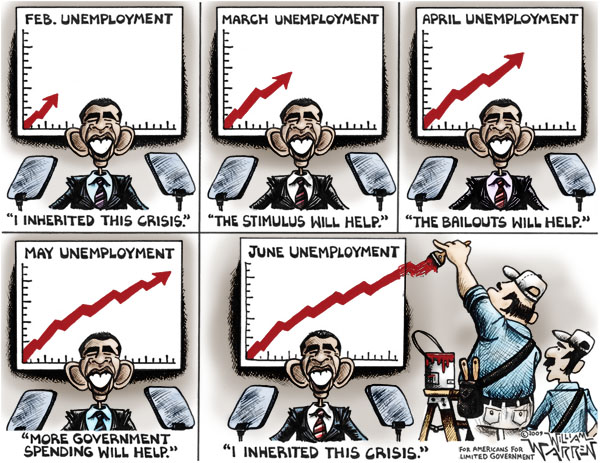And in a lot of other places too; that is if the Waxman-Markey “cap and trade” bill (H.R. 2454 – fair warning: the bill is a 1,092 page .pdf file) gets through the House and on to the Senate.
Here’s just some of the reaction. Let me start with the Americans for Limited Government group:
Americans for Limited Government President Bill Wilson today strongly urged Congress to reject legislation “that will deliberately increase the costs of gasoline, oil, and coal at a time when the American people can ill afford it.”
“While the American people are dealing with a brutal recession, soaring unemployment, and about to be hit with massive inflation, Congress in the Waxman-Markey bill is proposing to make energy more expensive to service a radical environmentalist agenda,” said Wilson.
“It is up to the Congress to stop this legislation dead on its tracks, before it causes an economic train wreck that will take decades to overcome,” Wilson added.
(snip)
“This bill was rejected last year, and should again be rejected this year, because it’s an economy-killer. It will cost jobs, it will cost progress, and it will cost prosperity. That is the price,” Wilson said.
Wilson says that what makes the bill even worse is that the science behind cap-and-trade is contrived and misleading. “The whole premise of global ‘warming’ is based upon flawed computer models that predict climate change, and are not based on actual observable data that can be confirmed.”
Wilson pointed to a study from APS Physics, “Climate Sensitivity Revisited”. “The Monckton study proves beyond any doubt that the UN International Panel on Climate Change’s computer models that ‘predict’ climate change greatly overstate the impact of carbon emissions. In other words, ‘man-made’ climate change is not real, and yet Congress is ready to reorganize the entire energy sector around the idea.” (Emphasis mine.)
Joining in the chorus was another pro-freedom group, Americans for Prosperity. AFP Policy Director Phil Kerpen:
The Pelosi/Reid/Obama team has been unable to pass cap-and-trade thus far for one simple reason: it’s an enormous tax. The country is struggling to cope with the current recession but the politicians in power don’t seem to care how this bill will affect your family.
President Obama famously said during the campaign “under my plan of a cap-and-trade system, electricity rates would necessarily skyrocket.” But he also pledged not to raise taxes “even one dime” on middle class Americans. Well it looks like he may be poised to break that promise.
We must band together and speak out with one voice in opposition to this egregious tax hike that will have virtually no beneficial impact on the environment. In fact, the EPA has even admitted that cap-and-trade could increase carbon emissions, as jobs flee the country and the painful regulations this bill will impose.
It’s time to kill this tax-hiking, job-killing, freedom-stifling legislation once and for all and your representative’s vote will be crucial on this bill.
The e-mail urges us to call our Congressman, which in our case is Frank Kratovil.
One voice I pay attention to on energy issues is that of my friend Jane Van Ryan at the American Petroleum Institute. She passed along this letter that API president Jack Gerard sent to each member of Congress while she weighs in on the Energy Tomorrow blog.
I’m not going to lie to you and say I read the entire bill – heck, most Congressmen haven’t either. But the part which worries me the most is buried fairly deep, as most sinister provisions of a measure are. Section 702 states:
SEC. 702. ECONOMY-WIDE REDUCTION GOALS.
`The goals of the Safe Climate Act are to reduce steadily the quantity of United States greenhouse gas emissions such that–
- `(1) in 2012, the quantity of United States greenhouse gas emissions does not exceed 97 percent of the quantity of United States greenhouse gas emissions in 2005;
- `(2) in 2020, the quantity of United States greenhouse gas emissions does not exceed 80 percent of the quantity of United States greenhouse gas emissions in 2005;
- `(3) in 2030, the quantity of United States greenhouse gas emissions does not exceed 58 percent of the quantity of United States greenhouse gas emissions in 2005; and
- `(4) in 2050, the quantity of United States greenhouse gas emissions does not exceed 17 percent of the quantity of United States greenhouse gas emissions in 2005.
To illustrate this better, I need to use an indicator made available by the federal government. (The key pages of this 439 page .pdf are pages 47 and 51.) If you assume, as I do, that greenhouse gas production is roughly equivalent to energy usage (since our sources haven’t changed significantly in the last few decades – we’re still burning fossil fuels for the most part) then in 2005 each person used 340 million BTU of energy. This is a number which has remained remarkably constant over several decades and actually peaked way back in 1978-79.
To achieve the Waxman-Markey numbers on a per-person basis, though, we’d have to retreat to 330 million BTU of energy per person in just two years. Okay, maybe that’s doable, although the last time we came in under that amount was 1987 (under that evil anti-environmental President Reagan).
But in one decade we would have to retreat to 272 million BTU per person to meet the 2020 mandates. Folks, we haven’t seen that level of energy usage since the early 1960’s. And I don’t know about you, but my lifestyle isn’t conducive to that of an era when the Beatles were the “in” thing musically and many of us weren’t born yet. It gets even worse as restrictions become tougher, bringing our per-person usage back to pre-1949 levels by 2030. (The EIA statistics only date back to 1949.)
If you look at page 47, that chart breaks down where energy usage comes from. Just about 7% of our BTUs come from “renewable” sources and the vast majority of those are hydroelectric (think of dams) and biomass (generally burning garbage). Less than 1% comes from the environmentally favored solar, wind, and geothermal power sources.
And it’s this paucity of renewable energy sources that scares me most. The government can work until doomsday building “clean” sources but they would come nowhere near meeting demand. Naturally, they would need jillions of our tax dollars to do so and that’s where the cap-and-trade “energy tax” comes in.
In a nutshell, this artificially-created market creates a “commodity” out of carbon, where those who use it “excessively” can purchase credits from those who have them available, although all these credits originally eminate from the federal government.
Maryland is one of several states who already have a somewhat similar scam ongoing called the Regional Greenhouse Gas Initiative. While there is supposedly a small benefit for all of us through the Maryland Strategic Energy Investment Fund (the fund where Maryland’s RGGI auction proceeds are supposed to go) it looks more like a handy means of income redistribution based on target households. Certainly the miniscule savings we may receive is going to be overshadowed by the higher prices we pay for consumer goods once businesses pass on their increased energy costs under Waxman-Markey.
Just to be clear, if someone wants to put up a windmill in their back yard or slap a solar panel on their roof to “save the planet”, be my guest. But don’t expect me to willingly pay higher taxes and increased utility bills just to make some do-gooder politicians feel better and think they’re making a dent in so-called global warming. Until you blot out the sun, you’re barking up the wrong tree when it comes to climate change.
Update, Thursday 10 a.m. : Paul Blumenthal, writing for the Sunlight Foundation Blog, points out that the 1,000-page plus version of the bill I cited from the GPO was mysteriously fertilized overnight and is now significantly larger.
Another budget-busting feature I found was that any jobs created by the bill had to pay the so-called “prevailing wage” in compliance with the Davis-Bacon Act. Look for Section 338.
Update 2, Thursday 2 p.m. : Once again this is a featured national post on the Red County site. They even kept my title this time.



